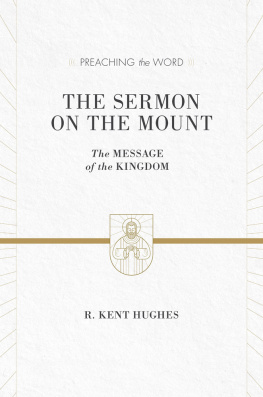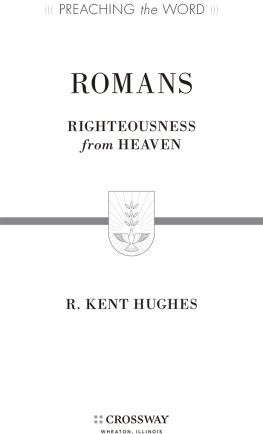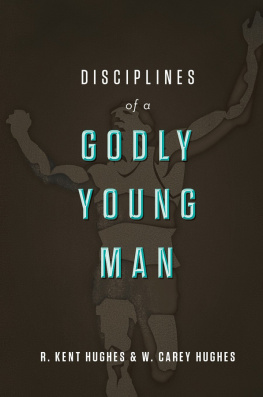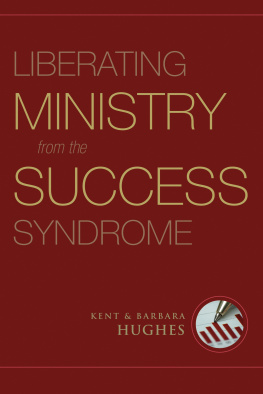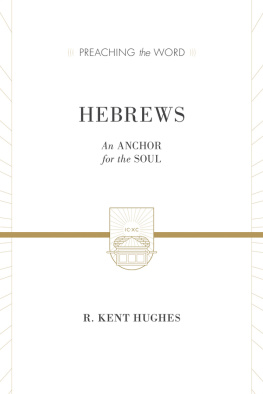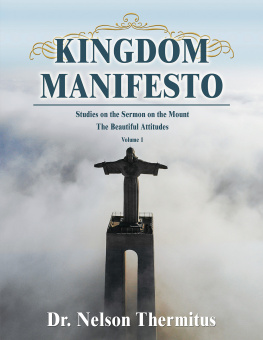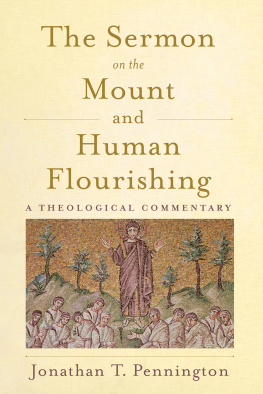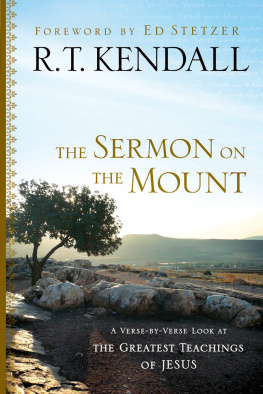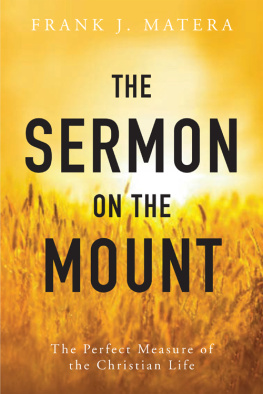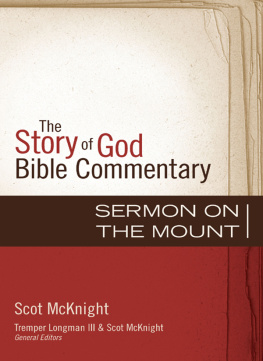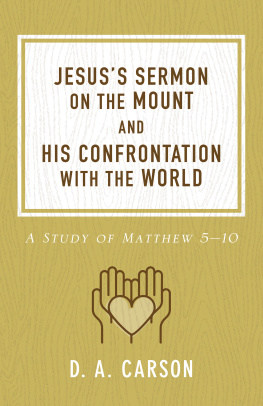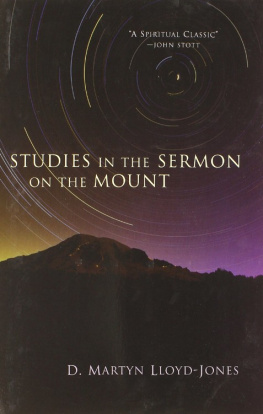When people ask me which book influenced me most outside the Scriptures, my answer is Dr. Martyn Lloyd-Joness The Sermon on the Mount . As a young pastor in the early seventies, I was stunned by the primary truth of the Beatitudes as opened by the Doctor. I wrote Lloyd-Jones at Westminster Chapel and some months later received back a card in his own crabbed hand. It is one of my treasures. No proper acknowledgment could be made apart from him. Likewise, I must mention the excellent work of my administrative assistant Mrs. Lillian Smith, who we both know is smarter than I am. Thanks for your careful attention to detail and support through this exhilarating study. Also, thanks to my long-time friend, Herbert Carlburg, whose attention to detail astounds us all. Of course, any defects in this work are solely mine. Thanks also to the congregation of College Church. There is a sense in which the congregation makes the preacher.
There are times when I am preaching that I have especially sensed the pleasure of God. I usually become aware of it through the unnatural silence. The ever-present coughing ceases and the pews stop creaking, bringing an almost physical quiet to the sanctuarythrough which my words sail like arrows. I experience a heightened eloquence, so that the cadence and volume of my voice intensify the truth I am preaching.
There is nothing quite like itthe Holy Spirit filling ones sails, the sense of his pleasure, and the awareness that something is happening among ones hearers. This experience is, of course, not unique, for thousands of preachers have similar experiences, even greater ones.
What has happened when this takes place? How do we account for this sense of his smile? The answer for me has come from the ancient rhetorical categories of logos , ethos , and pathos .
The first reason for his smile is the logos in terms of preaching, Gods Word. This means that as we stand before Gods people to proclaim his Word, we have done our homework. We have exegeted the passage, mined the significance of its words in their context, and applied sound hermeneutical principles in interpreting the text so that we understand what its words meant to its hearers. And it means that we have labored long until we can express in a sentence what the theme of the text isso that our outline springs from the text. Then our preparation will be such that as we preach, we will not be preaching our own thoughts about Gods Word, but Gods actual Word, his logos . This is fundamental to pleasing him in preaching.
The second element in knowing Gods smile in preaching is ethos what you are as a person. There is a danger endemic to preaching, which is having your hands and heart cauterized by holy things. Phillips Brooks illustrated it by the analogy of a train conductor who comes to believe that he has been to the places he announces because of his long and loud heralding of them. And that is why Brooks insisted that preaching must be the bringing of truth through personality. Though we can never perfectly embody the truth we preach, we must be subject to it, long for it, and make it as much a part of our ethos as possible. As the Puritan William Ames said, Next to the Scriptures, nothing makes a sermon more to pierce, than when it comes out of the inward affection of the heart without any affectation. When a preachers ethos backs up his logos , there will be the pleasure of God.
Last, there is pathos personal passion and conviction. David Hume, the Scottish philosopher and skeptic, was once challenged as he was seen going to hear George Whitefield preach: I thought you do not believe in the gospel. Hume replied, I dont, but he does . Just so! When a preacher believes what he preaches, there will be passion. And this belief and requisite passion will know the smile of God.
The pleasure of God is a matter of logos (the Word), ethos (what you are), and pathos (your passion). As you preach the Word may you experience his smilethe Holy Spirit in your sails!
R. Kent Hughes
Wheaton, Illinois
MATTHEW 5:13
Blessed are the poor in spirit, for theirs is the kingdom of heaven.
5:3
JESUS SERMON ON THE MOUNT is so famous and powerful that we can hardly overstate its influence. St. Augustine, for example, described it as a perfect standard of the Christian life. The great preacher-poet John Donne spoke of it in the most ornate terms:
As nature hath given us certain elements, and all our bodies are composed of them; and art hath given us a certain alphabet of letters, and all words are composed of them; so, our blessed Saviour, in these three chapters of this Gospel, hath given us a sermon of texts, of which, all our sermons may be composed. All the articles of our religion, all the canons of our Church, all the injunctions of our princes, all the homilies of our fathers, all the body of divinity, is in these three chapters, in this one sermon in the Mount.
Dietrich Bonhoeffer based his classic The Cost of Discipleship upon its exposition. The influence of the Sermon on the Mount is truly past reckoning.
The Sermon on the Mount has even exerted a great influence on those outside the Christian faith. Its influence upon Gandhis political approach is a matter of common knowledge. Those who hate Christianity and its ethics likewise have made it an object of contempt. It is seen as the source of the slave morality that Nietzsche so hated. When Nietzsches teaching bore its terrible fruit during the ascendancy of National Socialism in Germany, the Sermon was vigorously attacked by men like Alfred Rosenberg, and a modified version was produced for those who wanted to remain within the Christian tradition and accommodate themselves to Hitlers philosophy. So like it or not, everyone in Western civilization has been touched in some way by the Sermon on the Mount. No one can legitimately minimize its influence.
For the Christian believer, it is simply the greatest sermon ever preached. Why is this? To begin with, it came from the lips of Jesus. The original sermon was probably quite long, possibly even several hours, and what we have in Matthew 57 (which takes about ten minutes to read) is a distillation of his teaching. The Sermon on the Mount is the compacted, congealed theology of Christ and as such is perhaps the most profound section of the entire New Testament and the whole Bible. Every phrase can bear exhaustive exposition and yet never be completely plumbed. Along with this, it is the most penetrating section of Gods Word. Because the theme is entering the kingdom of heaven, it shows us exactly where we stand in relation to the kingdom and eternal life (see 5:3; 7:21). As we expose ourselves to the X-rays of Christs words, we see whether we truly are believers, and if believers, the degree of the authenticity of our lives. No other section of Scripture makes us face ourselves like the Sermon on the Mount. It is violent, but its violence can be our ongoing liberation! It is the antidote to the pretense and sham that plagues Christianity.
For me personally, the Sermon has been the most important factor in my spiritual life. Every time I return to it, especially the Beatitudes, I am brought up short as I face the bedrock reality of this amazing revelation. My dream and prayer is that somehow the spirituality of the Sermon on the Mount will penetrate our hearts, lifting us from the mediocrity that characterizes our society.
We will begin with the Beatitudes, which someone has, not inaccurately, called the Beautiful Attitudes of the kingdom, for they give us the character of those who are true children of God. Many suggested titles say essentially the same thing: The Character of the Kingdom, The Manifesto of the Kingdom, The Norms of the Kingdom. The first four Beatitudes focus on our relationship to God, and the second four on our relationship to our fellowman. Each of the eight builds upon the other, so that there is an amazingly beautiful and compelling progression. At the same time there is a profound unity. The first Beatitude (v. 3) and the last Beatitude (v. 10) end with the same reward, the kingdom of heaven, which according to Hebrew style means that the Beatitudes between them all deal with that very same theme.
Next page
